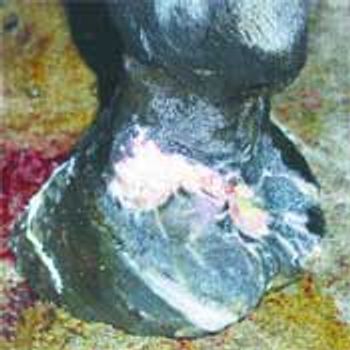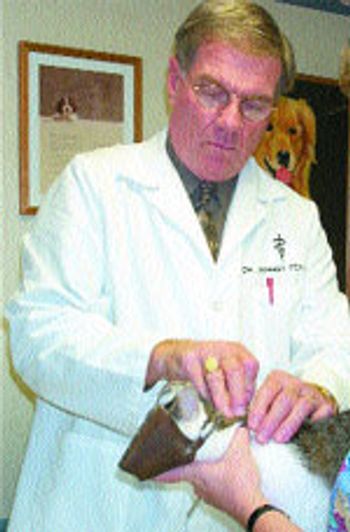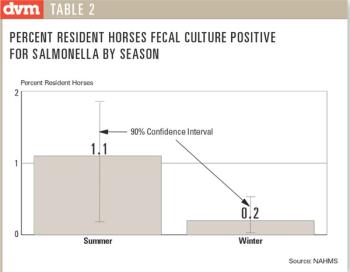
Colorado State University (CSU)'s Veterinary Teaching Hospital is now among three U.S. veterinary teaching hospitals to offer acupuncture and chiropractic services for equine.

Colorado State University (CSU)'s Veterinary Teaching Hospital is now among three U.S. veterinary teaching hospitals to offer acupuncture and chiropractic services for equine.

The bacteria to blame for nocardioform placentitis, a reproductive disease of thoroughbred racehorses that leads to weakened or stillborn foals, can no longer hide, according to new research.

The West Coast appears to be the next victim of the West Nile.

Horses with recurrent airway obstruction may no longer have to suffer following Food and Drug Administration approval of a specially designed equine inhaler with medication.

Dr. Dean A. Henrickson offers insight to managing leg injuries in horses which left untreated can be career ending.

Eight veterinary students were selected to receive $2,500 scholarships from the American Association of Equine Practitioners and the American Livestock Insurance Co.

The U.S. Department of Agriculture has released the remaining four fact sheets based on the National Animal Health Monitoring System Equine '98 study.

Lexington, Ky.-A new "hybrid" theory has recently surfaced suggesting a blend of caterpillars, molds, and the right timing during gestation might have caused the springtime late-term abortions and early fetal losses, called the mare reproductive loss syndrome (MRLS), according to The Horse Interactive.

Louisville, Ky.-A third of a billion dollars is the price tag on the Mare Reproductive Loss Syndrome (MRLS), which wreaked havoc on the Kentucky horse industry last spring, according to a recently published economic report.

Dr. Jerry Black, 1971 DVM graduate of Colorado State University, surmises that the daily planners of the new generation of veterinary graduates do not look like his did 30 years ago. The incoming president and 20-year member of the American Association of Equine Practitioners (AAEP) acknowledges the new generation has "different priorities. "

Washington-Financial and legislative efforts tied to mare reproductive loss syndrome (MRLS) have done more than bend some ears on Capitol Hill, according to The Horse Interactive.

Kentucky-Construction of a podiatry and reproduction facility is under way at Rood and Riddle Equine Hospital.

Columbus, Ohio-Are the risk factors in mares with late-gestation and early fetal losses in central Kentucky also applicable to the outbreak in southeastern Ohio?

Lexington, Ky.-A new "hybrid" theory has recently surfaced suggesting a blend of caterpillars, molds and the right timing during gestation might have caused the springtime late-term abortions and early fetal losses, called mare reproductive loss syndrome (MRLS), according to The Horse Interactive.

The Academy of Veterinary Dentistry (AVD), providing fellowship status to qualifying small animal veterinarians for 13 years, has drafted a plan to extend such status to its equine colleagues.

This has been a difficult year for horses and weather. First we had spring forest fires in the west that lead to emergency evacuations and disruption of pastureland for horses in that area.

NEWPORT, TENN.- Dr. John Chambers knows when to back away from an angry cat. He learned after losing a fingertip.

Raleigh, N.C. - A new non-invasive test, developed by researchers at the North Carolina State University College of Veterinary Medicine, can detect pulmonary problems in horses.

Atlanta - Georgia Commissioner of Agriculture Tommy Irvin would like to "move up in line" to receive the USDA-approved vaccine for West Nile Virus, following confirmation of the virus in a horse in the state.

Carbondale, Ill. - The plant-based sugar, mannose, can cure and prevent endometritis, a uterine infection causing mare infertility, a scientist reports.

The striped skunk is being monitored closely by researchers who believe the animal serves as an intermediate host for Sarcocystis neurona, a parasite that causes equine protozoal myeloencephalitis (EPM) in horses.

Eau Claire, Wis.- Following news that 18 horses in northwestern Wisconsin recently died from a suspected Eastern equine encephalomyelitis (EEE) outbreak, Dr. Robert Ehlenfeldt, Wisconsin's assistant state veterinarian, blames insufficient vaccination.

ROCKVILLE, MD.- The National Animal Health Monitoring System (NAHMS) Equine '98 study deviates from prior scientific reports of Salmonella and the U.S. horse population,

East Lansing, Mich.-At least six of every 10 horses in the state of Michigan have been exposed to Sarcocystis neurona, the parasite responsible for Equine Protozoal Myeloencephalitis (EPM), according to study results from researchers at Michigan State University.

Rockville, Md.-The National Animal Health Monitoring System (NAHMS) Equine '98 study deviates from prior scientific reports of Salmonella and the U.S. horse population, namely because of the horses it sampled, reports the U.S. Department of Agriculture.

Fort Collins, Colo.-The first-ever foals produced from eggs harvested from a mare, frozen and then thawed, were born in mid-July at Colorado State University's Animal Reproduction and Biotechnology Laboratory.

Shawnee Mission, Kan.- Bayer announces it has received approval from the Center of Veterinary Medicine of the Food and Drug Administration (FDA) for Marquis (15 percent w/w ponazuril) Antiprotozoal Oral Paste for the treatment of equine protozoal myeloencephalitis (EPM). Marquis offers equine veterinarians and their clients the first FDA-approved treatment for EPM, combining safety, efficacy and convenience, the company says.

Though on a much smaller scale, several of Kentucky's closest neighbors - Indiana, Ohio, and West Virginia - have reported incidents that may be associated with the Mare Reproductive Loss Syndrome (MRLS), which plagued Kentucky's mares and foals throughout April and May.

DVMs sort through endless discussions of caterpillars and cherry trees in search of final answer to perplexing horse syndrome

Sequence of environmental conditions set the stage for foal abortions, research says